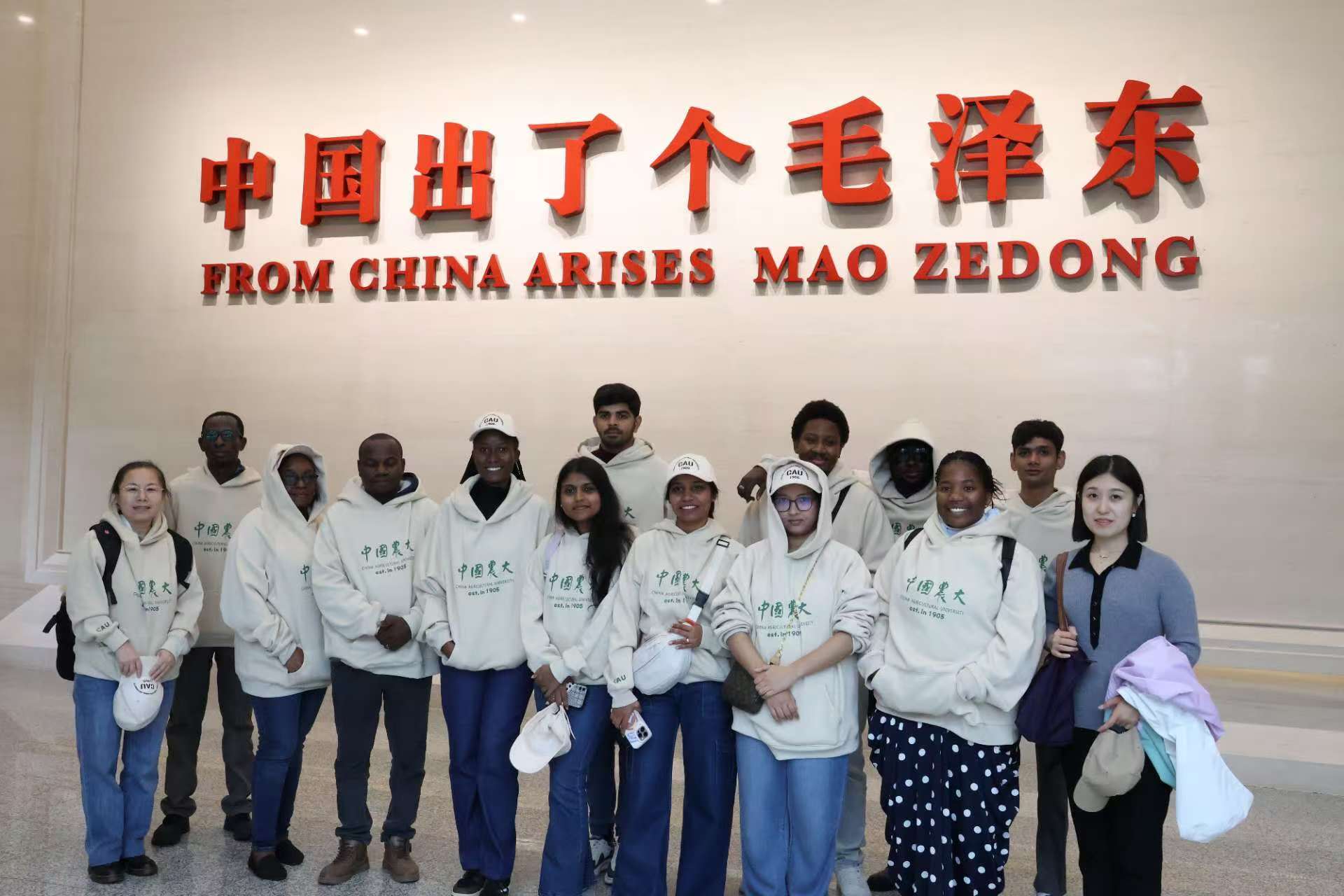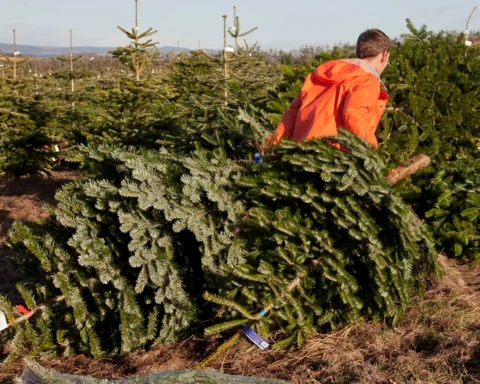We attended a conference in Changsha, Hunan Province, which allowed us to combine learning with cultural experiences. Our journey began from China Agricultural University’s East Campus on October 18, 2024 and continued until October 23, 2024.
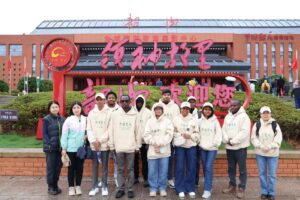
The conference, themed “Bridging Sustainability: Integrating Green Finance for Agricultural and Rural Development,” was organized by Hunan University, China Agricultural University, and the International Food Policy Research Institute (IFPRI). The conference ran from October 18 to 20, 2024, covering key topics on sustainability and green finance. From October 21 to 23, 2024, we visited historical landmarks, including Mawangdui Han Dynasty Tomb, Yuelu Academy, Orange Isle, Mao Zedong’s museum, His hometown, the Hunan Agricultural University and it’s museum and Hunan museum.
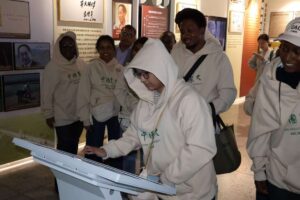
These visits helped us better appreciate the rich history of the region while also supporting our academic and professional development. This combination of academic learning and cultural exploration made for an enriching experience.
On the first day, we departed from China Agricultural University’s East Campus at 5:00 AM, heading to Beijing Railway Station for a high speed train to Changsha, arriving at 1:18 PM. After checking in at the World Hotel and having lunch, we visited the Mawangdui Han Dynasty Tomb, renowned for its well-preserved remains and artifacts from the Han Dynasty.
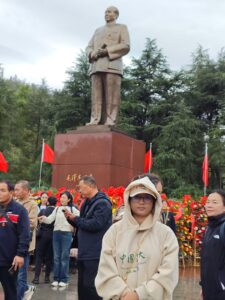
The visit offered a unique look into ancient burial customs and the cultural achievements of early Chinese dynasties. Overall, it was an enriching experience, providing valuable insights into Han Dynasty history and heritage.
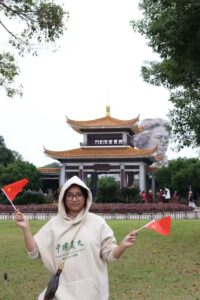
Mawangdui Han Dynasty Tomb
On the second, we left at 8:45 AM to attend the Opening Ceremony of the 16th CAER Annual Conference.
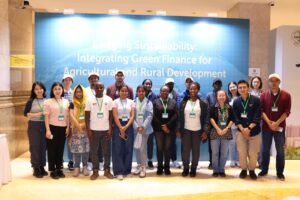
The event started with inspiring speeches from prominent figures like Prof. Xian Xin, Prof. Helian Xu, and Dr. Johan Swinnen, emphasizing innovation and collaboration in research. Several invited sessions followed, featuring keynote speakers such as Prof. Rodolflo M. Nayga Jr. and Prof. H. Holly Wang, who shared their valuable insights on topics like circular bioeconomy, food security, and sustainability.
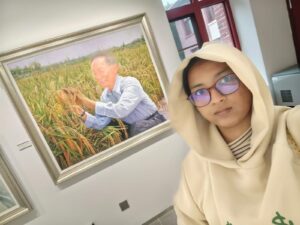
These sessions offered both inspiration and practical guidance, encouraging participants to reflect on their academic journeys and the broader impact of their work. After a refreshing coffee break at 10:00 AM, we attended the second invited session which was moderated by Prof. Haiqi Li. This session featured several distinguished keynote speakers who shared their personal journeys, focusing on both their achievements and the challenges they had overcome in academia. Hearing their candid reflections on navigating research complexities and the importance of resilience deeply resonated with me. Dr. Dil B. Rahut’s talk on the future of smallholder farming in South Asia highlighted critical issues in agriculture, while Dr. Jawoo Koo’s insights on digital innovations emphasized how technology can drive equitable transformation in food and land systems.
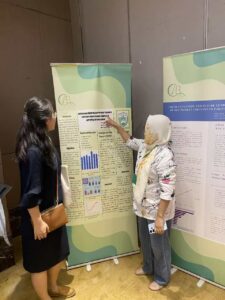
Dr. Sandra Broka’s discussion on rural finance gave me a better understanding of the key financial solutions supporting sustainable agricultural development.
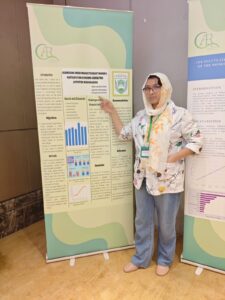
During the buffet lunch, I had the opportunity to network with peers and exchange ideas, making valuable connections for future collaborations. After lunch, Session A1 focused on rural and green finance, discussing innovative financing models and how they support sustainable agricultural practices.

One of the key papers on “Climate Change and Credit Risk of Rural Financial Institutions” provided me with a deeper understanding of the financial challenges rural communities face due to extreme weather events, a topic I found particularly relevant.
The presentation on digital financial literacy and its impact on rural household resilience reinforced the importance of education and access to digital tools in improving economic stability, which resonated with my own research interests. I was also fascinated by the session on green innovation and how it is reshaping financing costs for agricultural enterprises in China. Learning about how green finance improves energy efficiency in agriculture provided practical insights that I hope to incorporate into my work.
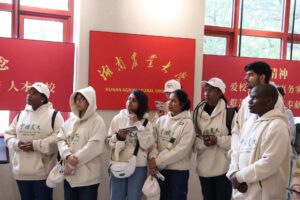
During the International Young Scholars Forum, I had the opportunity to present my poster on “Harnessing Green Finance to Boost Women Participation in Income-Generating Activities in Bangladesh.” The discussion centered on how green finance can provide women with the financial support needed to engage in sustainable agricultural and entrepreneurial ventures. By improving access to funds and offering tailored financial products, green finance can empower women to contribute more effectively to the economy, while also promoting environmentally sustainable practices. The feedback from peers and scholars was insightful, helping me refine my approach and consider broader implications for policy-making and rural development.

Poster presentation
Overall, the second day was a rich and informative experience. It provided me with practical knowledge on key topics like climate change, rural finance, and digital literacy. The diverse presentations and meaningful exchanges with experts were invaluable for both my academic growth and professional development. The sessions not only expanded my understanding of green finance but also inspired me to further explore these issues in my own research.
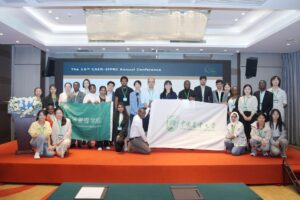
On the third day, I attended Parallel Session J: Contemporary Issues in Agricultural and Rural Development in Developing Countries, where I gained valuable insights into key challenges such as gendered migration in Ethiopia and the impact of climate change on rural development. The session highlighted the feminization of agriculture and the importance of gender-sensitive policies to support women farmers. Other presentations explored innovative solutions for climate resilience in Kenya, emphasizing socio-technical bundles that empower women in smallholder agriculture. I also learned that while climate risks do pose challenges to agriculture in Tanzania and Malawi, proper interventions can maintain nitrogen use efficiency (NUE) and profitability. Additionally, a paper on livestock insurance in pastoral China revealed how insurance can change farmers’ risk-taking behaviors. Later, a roundtable forum on green finance in the agri-food system stressed the need for collaboration between financial institutions and governments to promote sustainable agriculture. The day concluded with a visit to the historic Yuelu Academy, where I explored the rich heritage of Confucian learning and its evolution into Hunan University, reflecting on the enduring value of education in Chinese history.

Yuelu Academy
On the fourth day, we began with a visit to Orange Isle from 8:45 to 11:30 AM, where I admired the island’s natural beauty and explored the towering Mao Zedong statue, learning about its cultural and historical significance. The visit emphasized the importance of balancing tourism with environmental conservation. At 12:30 PM, we visited Thai Ping Street, a vibrant area rich in local shops and culture, followed by lunch at a nearby restaurant, offering traditional dishes. In the afternoon, from 1:30 to 6:00 PM, we toured Hunan Agricultural University and its museum, learning about the region’s agricultural history and technological advancements. I attended an insightful academic presentation by Professor Mohammad Jahangir Alam, PhD, on livestock extension services and food security in the Southern Delta Region of Bangladesh, which emphasized the role of livestock in enhancing food security. The day ended with a traditional dinner, providing a moment to reflect on the day’s enriching experiences.
Orange Isle Thai Ping Street Hunan Agricultural University.
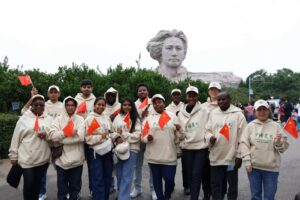
Chinese Agricultural Civilization Museum (Hunan Agricultural University)
On the fifth day, we began our journey with a visit to Mao Zedong’s Museum in Shaoshan from 9:00 AM to 12:50 PM. The museum provided a comprehensive look into Mao’s early life, education, political rise, and his leadership during key moments in Chinese history, such as the Cultural Revolution. Exhibits displayed personal artifacts, photographs, and multimedia presentations, offering deep insights into his legacy. After a lunch break at a nearby restaurant featuring local Hunan cuisine, we visited Mao Zedong’s school, the First Normal School of Hunan, and his birthplace in Shaoshan.
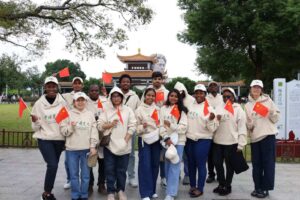
Mao Zedong’s Museum Mao Zedong’s Birthplace
These visits highlighted Mao’s humble rural beginnings and his intellectual development in a simple school environment. The day concluded with a return to the hotel and dinner at a local Muslim restaurant, where we reflected on the historical and cultural richness of our experiences in Changsha.
On the final day in Changsha, we began with a hearty breakfast at the World Hotel from 7:00 to 8:00 AM, enjoying a mix of traditional and international dishes to energize for the day ahead. At 8:45 AM, we gathered in the hotel lobby, excited for the day’s cultural exploration. Our first stop was the Hunan Museum, where we arrived at 9:00 AM. The museum’s impressive collection, particularly the Mawangdui Han tomb relics, offered deep insights into China’s ancient history, customs, and art from the Han Dynasty. The intricate craftsmanship of the artifacts, including silk garments, lacquerware, and ancient texts, showcased the advanced skills and rich heritage of the era. I learned about Hunan’s historical significance and how these relics shaped modern Chinese culture and politics, making the museum visit an enriching experience.
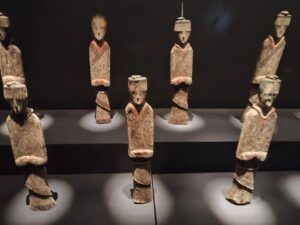
Hunan Museum
Hunan Museum
After the museum, our Changsha tour concluded at 12:30 PM, and we made our way to Changsha South Railway Station to begin our journey back to Beijing. At 1:20 PM, we enjoyed a quick lunch, where I tried a spicy fish burger, a delicious end to our time in Changsha. We boarded the train at 2:19 PM, and during the comfortable ride, I reflected on the cultural discoveries of the day. We arrived in Beijing at 7:30 PM, and by 9:21 PM, we reached China Agricultural East Campus, marking the end of a memorable journey filled with learning and cultural exploration.
Prepared By
Laila Akter Zaman
Major in Agricultural Economics
and Management (MS)
College of Economics and Management
China Agricultural University

